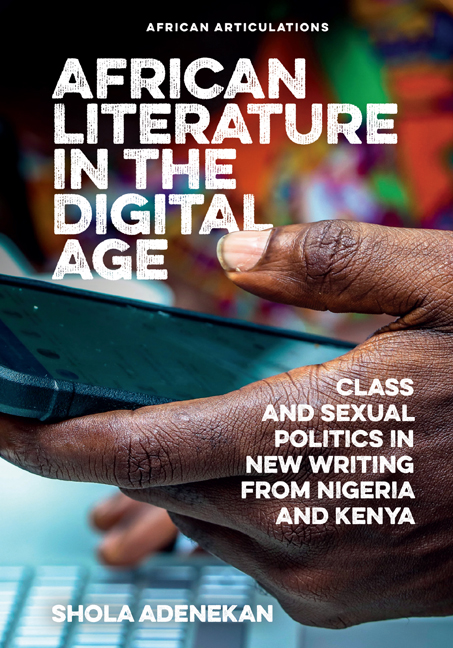 African Literature in the Digital Age
African Literature in the Digital Age Book contents
- Frontmatter
- Dedication
- Contents
- List of Illustrations
- Acknowledgements
- List of Abbreviations
- Introduction: Kenyan and Nigerian Writers in the Digital Age
- 1 Network Thinking: Literary Networks in the Digital Age
- 2 Class and Poetry in the Digital Age
- 3 Class Consciousness in Online Fictions
- 4 Digital Queer: The Queering of African Literature
- 5 Middle-Class, Transnational, Queer, and African
- 6 ‘Ashewo no be job’: The Figure of the Modern Girl in the Digital Age
- 7 The Erotic in New Writing from Nigeria
- 8 Social Media and the Aesthetics of the Quotidian
- Conclusion: Connecting the Dots
- Bibliography
- Index
- Miscellaneous Endmatter
8 - Social Media and the Aesthetics of the Quotidian
- Frontmatter
- Dedication
- Contents
- List of Illustrations
- Acknowledgements
- List of Abbreviations
- Introduction: Kenyan and Nigerian Writers in the Digital Age
- 1 Network Thinking: Literary Networks in the Digital Age
- 2 Class and Poetry in the Digital Age
- 3 Class Consciousness in Online Fictions
- 4 Digital Queer: The Queering of African Literature
- 5 Middle-Class, Transnational, Queer, and African
- 6 ‘Ashewo no be job’: The Figure of the Modern Girl in the Digital Age
- 7 The Erotic in New Writing from Nigeria
- 8 Social Media and the Aesthetics of the Quotidian
- Conclusion: Connecting the Dots
- Bibliography
- Index
- Miscellaneous Endmatter
Summary
In Blogging Queer Kenya, Keguro Macharia directs us to the emerging aesthetics of ordinariness in the Kenyan digital space.
In their narratives, younger writers have moved away from the allegorical mode privileged by Ngũgĩ wa Thiong’o, Kenya's best known writer, and are now focused on quotidian details, without taking on the burden of representing revolutionary peasants, the urban working class, or betrayed freedom fighters. These characters are not absent from contemporary fiction; instead, they are no longer the privileged subjects of representation.
Macharia's statement is apt: all too often, African narratives come with stereotypes of magic realism and the extraordinary, what Wainaina in ‘How To Write About Africa’ describes as ‘naked warriors, loyal servants, diviners and seers, ancient wise men living in hermitic splendour’ (n.pag). These stereotypes are best represented by the images of Africa so familiar from Hollywood films filled with colonial fantasies and from pseudo-documentary newsreels of blood thirsty dictators like The Last King of Scotland; by photographic images of the exotic continent that have become the staple of the National Geographic magazine; by Nollywood films filled with magical powers and Christian miracles. Even in the twenty-first century, the images of Africa that many Westerners see in Billboards, print and broadcast media are often that of starving children who need to be rescued by charitable organisations. Equally problematic, however, is the Harlem Renaissance's romantic depiction of the continent –represented in Countee Cullen's famous poem ‘Heritage’ –as a Utopia, with exotic culture and people.
The rise of the everyday in African writings speaks to an aesthetic strategy that is no longer preoccupied with responding to the aforementioned imaginary about Africa, but one that reflects what Evan Mwangi uses as the title of his book –Africa writes back to self (2009). I make this argument based on the hypothesis that the first generation of contemporary Nigerian and Kenyan writers focuses on making a space for African literature in the world's republic of letters. Equally important, writers of that generation also see their responsibilities as fighting the ‘culture war’ on behalf of Africans who have long been represented as savages in some canonical Western texts.
- Type
- Chapter
- Information
- African Literature in the Digital AgeClass and Sexual Politics in New Writing from Nigeria and Kenya, pp. 143 - 164Publisher: Boydell & BrewerPrint publication year: 2021
